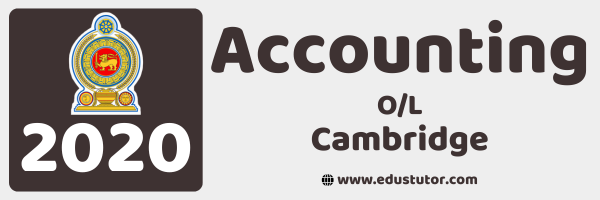The 2020 Cambridge O/L Accounting Past Paper – Part 2 is a vital resource for students aiming to succeed in the structured component of their O Level Accounting exam. For Sri Lankan students following the Cambridge syllabus, mastering Paper 2 is key to scoring a high grade. This paper tests your ability to handle practical accounting situations — from preparing financial statements to correcting errors and interpreting real-world scenarios.
Unlike Paper 1, which focuses on multiple-choice questions, Paper 2 challenges students with deeper questions that require clear, accurate answers and logical structuring. Understanding this past paper will help students sharpen their problem-solving and application skills — two critical abilities for both the exam and real-life business accounting.
At EDUS Wiki, we break down each question from this paper with detailed solutions, examiner tips, and guidance to help you avoid common mistakes. Our goal is to empower you with clarity and confidence during your exam preparation. Whether you are preparing independently or with a tutor, this article serves as your complete revision companion.
In this guide, we explore each section of the 2020 Cambridge O/L Accounting Part 2 Paper, providing question analysis, model answers, and tips for presenting your work in exam-ready format. With structured solutions and insights tailored for Sri Lankan Cambridge students, this is your one-stop article for improving your accounting exam performance.
Let’s dive into the key questions and learn how to ace Cambridge O/L Accounting Paper 2 – 2020.
Detailed Examination of Topic
Understanding the Structure of Paper 2 – 2020 Edition
The 2020 Cambridge O/L Accounting Part 2 paper consisted of five structured questions, covering core topics like financial statements, ledger entries, corrections of errors, and accounting theory. Here’s a breakdown of what was tested and how to prepare for each.
1. Ledger Entries and Posting Transactions
Students were required to post transactions into ledger accounts, including opening and closing balances.
- Tip: Carefully label each entry with the correct account title and date.
- Common mistake: Mixing up debit and credit entries for expense and revenue accounts.
2. Trial Balance and Suspense Account
Candidates were asked to prepare a trial balance and resolve discrepancies using suspense accounts.
- Key advice: Always check if the total debits and credits match — if not, review transaction entries.
- EDUS Wiki Tip: Practice correcting different types of errors (e.g., error of omission, principle, reversal).
3. Final Accounts Preparation
The question included preparation of an Income Statement and a Statement of Financial Position.
- Marks were awarded for layout, accuracy, and correct use of headings.
- Sri Lankan students are advised to memorize formats and understand adjustments like accruals and depreciation.
4. Theory Questions
Questions focused on source documents, control accounts, and distinguishing between capital and revenue expenditure.
- Suggestion: Learn definitions with examples.
- Practice Tip: Try answering in point form for clarity during exams.
5. Application-Based Short Answers
Students had to explain real-world scenarios using accounting principles (e.g., benefits of using control accounts).
- Strategy: Use keywords and clear sentence structure. Avoid vague explanations.
2020 Cambridge O/L Accounting Past Paper – Part 2
Download Now..!
EDUS Wiki Support Tools
- Step-by-step answer guides
- Marking scheme explanations
- Visual templates of accounting statements
- Related articles: [2020 Paper 1], [2021 Part 2], [Accounting Revision Quiz]
Conclusion
In conclusion, the 2020 Cambridge O/L Accounting Past Paper – Part 2 is more than just a past exam — it is a tool for real exam success. Mastering each question and understanding examiner expectations will help you avoid mistakes and gain full marks, especially in structured questions.
For Sri Lankan students, this guide is tailored to bridge the gap between syllabus content and exam performance. Use it alongside EDUS Wiki’s resources for the best results.
Looking for more help?
📞 Do you have any doubts, join our classes. Call. +94 77 448 7774.
Explore model answers, download free resources, and learn smarter with EDUS Wiki – your trusted academic partner.



